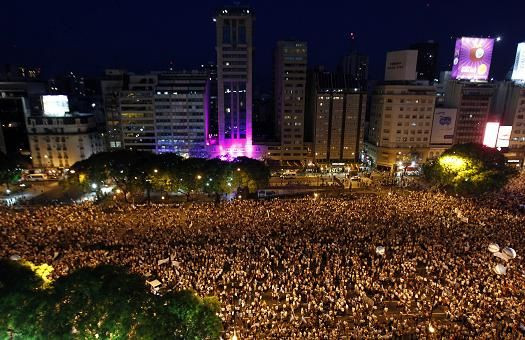Protests Mount Against Argentina's President Over Currency, Crime And Corruption

The streets of Buenos Aires filled with thousands of protesters angry over the policies of Argentine President Cristina Fernandez de Kirchner’s administration, amid rising inflation, increasing crime, and high-profile government corruption scandals.
Authorities estimated 700,000 demonstrators gathered Thursday night at the Plaza de Mayo in front of the presidential palace in Buenos Aires, while smaller protests were held throughout the country and among expatriates abroad.
"I came to protest everything that I don't like about this government, and I don't like a single thing starting with [the president's] arrogance," Marta Morosini, a 74-year-old retiree, told the Associated Press. "They're killing policemen like dogs, and the president doesn't even open her mouth. This government is just a bunch of hooligans and corrupters."
An uptick in violent crime intertwined with economic woes has prompted much criticism of the Fernandez administration. Home-invasion robberies have increased as many Argentines have been storing cash at home in response to strict currency controls that have depreciated the peso and made it more difficult to exchange them for dollars, which would protect their savings against inflation but feeds government anxiety over capital flight from the country.
The government reports inflation to be about 10 percent, but analysts estimate the figure is much higher, with some saying the rate is closer to three times that number, AP said.
Fernandez was re-elected to a second term with 54 percent of the vote last year, although her approval ratings have since dropped by more than 20 percent. The protests mirror those that took place a decade ago, which ushered her late husband Nestor Kirchner into the presidency in 2003.
Like Kirchner, Fernandez has increased government spending on social-welfare programs that benefit the poor and heavily regulated the economy, nationalizing major industries in some cases, with a focus on internal development over attracting foreign investment.
Fernandez and her supporters have argued that Kirchner’s economic policies saved the country from financial collapse in the early 2000s, but the recent global recession has cast a negative tinge on their current implementation.
Discontent with the current administration has been further compounded by corruption scandals involving senior government officials and the perceived effort to reform the constitution.
Vice President Amado Boudou is currently under investigation for embezzlement and money laundering, while Fernandez has been hesitant to distance herself from her handpicked right-hand man, adding to the perception that she is protecting him.
There is also concern among the political opposition that Fernandez and her coalition in the Legislature are seeking to amend the constitution and eliminate term limits, which would allow Fernandez to run for a third term. Last month, both houses of the Legislature -- dominated by Fernandez’s Front for Victory, or FPV, political alliance -- passed a bill lowering the voting age to 16 from 18, a move expected to benefit Fernandez and her party, which has stronger support among younger people than among older ones.
While the FPV has majorities in both legislative houses, it has yet to obtain a two-thirds majority, which would give it the voting power to amend the constitution.
"Don't anyone think that I'm going to go against my own politics, those that I've defended since I was 15 years old,” said Fernandez, defending her economic policies in a speech Thursday, the Al Jazeera news agency reported. “These are the politics I believe in, and this is the country I believe in."
© Copyright IBTimes 2024. All rights reserved.





















